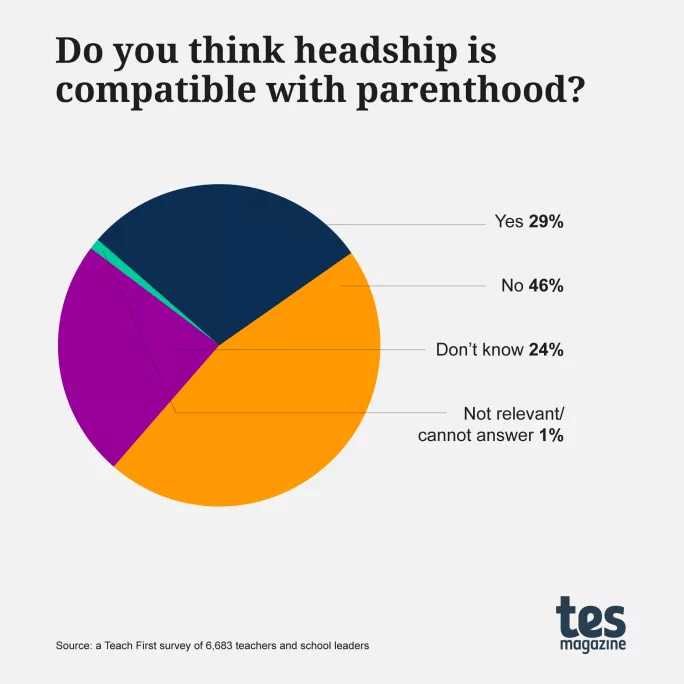Headship incompatible with parenthood, say nearly half of teachers

Nearly half of teachers and school leaders believe headship is not compatible with parenthood, a survey shared exclusively with Tes reveals.
The figure was slightly higher for women (49 per cent) than for respondents as a whole (46 per cent), the poll of nearly 8,500 teachers and leaders shows.
And more than a quarter of teachers (28 per cent) said they had considered going for a promotion but decided not to due to worries about balancing workload and family life.
Over half of respondents (52 per cent) said that an increase in flexible-working opportunities would make the profession more attractive to potential new teachers.
In the survey, carried out by education charity Teach First, more than half of teachers (52 per cent) thought that having more opportunities for flexible working would help to retain female teachers.

Last year’s government Schools White Paper pledged to champion a culture of flexible working.
And a contract published in June last year revealed that the Department for Education plans to pay up to £768,000 for the delivery of a “culture change programme” focused on embedding flexible working in schools and multi-academy trusts.
Despite this move, in the Teach First survey one in 10 respondents said they work at a school that does not allow flexible working requests.
Teachers worried about the stress of being a head
Male respondents were more positive about the compatibility of headship and parenthood.
Half of male respondents thought that the two roles were compatible, compared with just 35 per cent of female teachers and leaders.
Respondents in their twenties were also more positive, with 47 per cent believing the roles to be compatible, compared with 37 per cent of those in their thirties.
Writing for Tes today on the importance of embracing flexible working in the sector, Conservative MP and member of the Commons Education Select Committee Anna Firth said flexible working is an area that has been “significantly underexplored” when looking at solutions to high attrition from the sector.
- Flexible working: Why schools must embrace the new reality
- Teacher retention: DfE launches £750K plan to promote flexible working in schools
- Heavy workload: Nearly half of teachers considered quitting this year
Commenting on today’s polling data, Ms Firth said: “Supporting schools to offer more flexible options, from job shares to part-time and staggered hours, would allow us to retain more of the best teachers so that every child has a fair start in life.”
Her committee is also currently conducting an inquiry into teacher recruitment and retention, and will report back later this year.
In the survey, 14 per cent of respondents said they were interested in flexible working but had never had the confidence to ask for it.
But of those who had flexible-working requests rejected, 13 per cent said that the school felt it couldn’t cover the additional costs, nearly four in 10 (38 per cent) said the school felt it would cause timetable challenges and more than a fifth (21 per cent) said the school felt it could be disruptive to pupils.
Teachers put off going for promotions
Almost a third of female teachers (30 per cent) said they had considered going for a promotion but didn’t have enough confidence in their abilities to apply, compared with 21 per cent of male respondents.
Meanwhile, 31 per cent were worried about the additional stresses that a more senior job might bring and the effect on their work-life balance.
Russell Hobby, CEO of Teach First, said: “Whilst most sectors are increasingly offering flexibility in the workplace, schools find it hard to keep pace.
“First reactions are understandably that pupils simply need teachers in their classrooms. This is absolutely right. Yet I am seeing shining examples of schools offering excellent education for children and work-life balance for teachers, and it’s no coincidence that the two go together.
“But making these strides takes extra investment. So funding must urgently be directed to schools in low-income communities if we are to retain high-quality teachers and enable our children and country to succeed.”
Last year government data revealed that retention rates for newly qualified teachers were beginning to drop back to pre-pandemic levels, and new figures, due to be published today, are expected to reveal an even higher attrition rate.
You need a Tes subscription to read this article
Subscribe now to read this article and get other subscriber-only content:
- Unlimited access to all Tes magazine content
- Exclusive subscriber-only stories
- Award-winning email newsletters
Already a subscriber? Log in
You need a subscription to read this article
Subscribe now to read this article and get other subscriber-only content, including:
- Unlimited access to all Tes magazine content
- Exclusive subscriber-only stories
- Award-winning email newsletters
topics in this article



